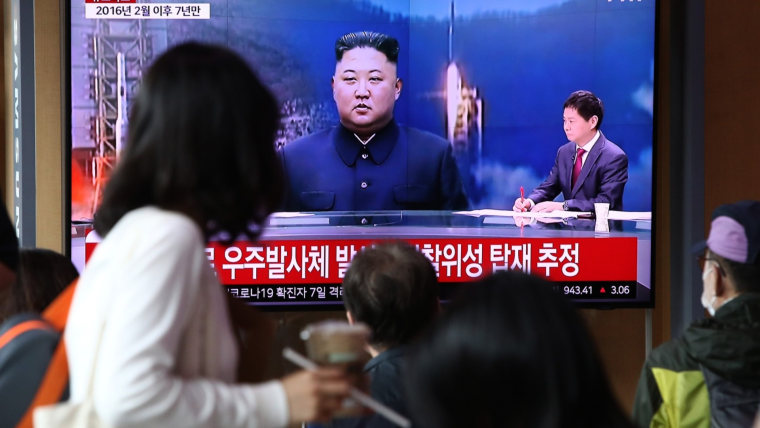[ad_1]
SEOUL, South Korea — North Korea launched a suspected intercontinental ballistic missile on Wednesday, its neighbors said, two days after threatening the United States over what it said were spy plane incursions into its airspace.
The South Korean military confirmed that North Korea had launched a suspected long-range ballistic missile toward the east from the outskirts of Pyongyang, the North Korean capital, around 10 a.m. Wednesday (9 p.m. Tuesday ET). It said surveillance had been strengthened and it was maintaining military preparedness in close cooperation with the U.S.
Japanese government spokesperson Hirokazu Matsuno said that while details were still being analyzed, the missile was estimated to have flown for about 74 minutes before falling into the Sea of Japan about 155 miles west of Okushiri Island in Hokkaido around 11:13 a.m.
The missile, which was launched at a lofted trajectory, was estimated to have traveled about 620 miles and reached a maximum altitude of about 3,725 miles. Matsuno said it landed outside Japan’s exclusive economic zone and that there were no reports of damage in the area.
Nuclear-armed North Korea launched its first ICBMs in 2017 as part of its effort to develop long-range weapons capable of reaching the continental U.S. It then observed a self-imposed moratorium on such launches until last year, when it resumed testing ICBMs amid stalled talks on denuclearization. North Korea is also thought to be preparing for its seventh nuclear test, which would be its first since 2017.
The launch on Wednesday was North Korea’s first missile test since June 15 and the first time it has launched an ICBM since April. Both South Korea and Japan condemned it as a violation of United Nations Security Council resolutions, which bar North Korea from using ballistic missile technology.
“These acts by North Korea threaten the peace and security not only of our country but also the region, as well as the international community, and it is absolutely unacceptable,” Japanese Prime Minister Fumio Kishida said from Lithuania, where he is attending a summit of NATO, the U.S.-led military alliance.
Kishida and South Korean President Yoon Suk Yeol, who is also at the summit, are expected to meet on Wednesday as part of efforts to improve relations between their two countries, both U.S. allies with close ties to NATO but not formal membership.
Yoon convened an emergency meeting of his National Security Council from Lithuania in response to the North Korean launch, his office said.
Earlier this week, Kim Yo Jong, the powerful sister of North Korean leader Kim Jong Un, said a U.S. military spy plane had illegally entered North Korea’s eastern exclusive economic zone eight times on Monday and been chased away by North Korean warplanes. Countries have the right to control marine resources within their exclusive economic zones, which extend 200 nautical miles from their territory, but they do not have sovereignty over the surface of the water or the airspace above it.
Kim warned that a “shocking incident” could occur if the U.S. intrusions continued. The North Korean Defense Ministry also said such flights could be shot down.
The South Korean military said the flight activity by the U.S.-South Korea alliance was normal and rejected North Korea’s claims as “utterly ridiculous.”
The U.S. government also dismissed Kim’s accusations, with State Department spokesperson Matthew Miller urging North Korea to “refrain from escalatory actions” and “engage in serious and sustained diplomacy.”
Pentagon spokesperson Sabrina Singh said the U.S. military always operated responsibly, safely and in accordance with international law.
“Those accusations are just accusations,” she told reporters on Monday.
Despite international sanctions, North Korea has continued to develop its nuclear weapons and missile programs. In April, North Korea tested its first solid-fuel ICBM, which experts say is harder to detect and counter than missiles that use liquid fuel. It is not clear how close the North is to having functioning nuclear-armed ICBMs capable of striking the U.S. mainland.
In May, North Korea also tried and failed to launch what it said was a military spy satellite. The South Korean military, which retrieved wreckage of the crashed satellite, said last week that it appeared to have no military use.
North Korea and South Korea have remained frozen in conflict since the Korean War, which ended in an armistice rather than a peace treaty 70 years ago this month.
[ad_2]
Source link

